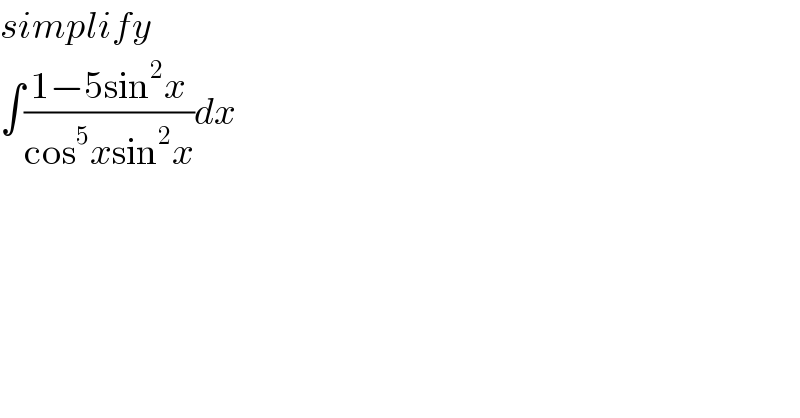
Question and Answers Forum
Question Number 111868 by mathdave last updated on 05/Sep/20

Answered by Her_Majesty last updated on 05/Sep/20

Commented by MJS_new last updated on 05/Sep/20
great!
Commented by Her_Majesty last updated on 05/Sep/20

Commented by mathdave last updated on 05/Sep/20

Commented by Her_Majesty last updated on 05/Sep/20

Commented by MJS_new last updated on 05/Sep/20
Sir mathdave please tell us, what is the answer?
Answered by mathdave last updated on 06/Sep/20
![solution to ∫((1−5sin^2 x)/(cos^5 xsin^2 x))dx I=∫(1/(cos^5 xsin^2 x))dx−∫((5sin^2 x)/(cos^5 xsin^2 x))dx I=∫sec^5 xcosec^2 x−5∫sec^5 x=A−5B.....(1) A=∫sec^5 xcosec^2 xdx (but cosec^2 x=1+cot^2 x) A=∫sec^5 xdx+∫sec^5 xcot^2 xdx=B+∫sec^3 xcosec^2 xdx A=∫sec^3 x(1+cot^2 x)dx+B=∫secxcosec^2 xdx+∫sec^3 xdx+B let C=∫sec^3 xdx A=∫secx(1+cot^2 x)dx+C+B=∫cotxcosecxdx+∫secxdx+B+C but ∫secxdx=ln(secx+tanx) A=∫cotxcosecxdx+ln(secx+tanx)+B+C but note ∫sec^n xdx=((sec^(n−2) xtanx)/(n−1))+((n−2)/(n−1))∫sec^(n−2) dx note sinh^(−1) (tanx)=ln(tanx+secx) when used sinh^(−1) x=ln(x+(√(1+x^2 ))) we have C=∫sec^3 xdx=(1/2)[sinh^(−1) (tanx)+tanxsecx] A=∫cotxcosecx+ln(tanx+secx)+(1/2)[sinh^(−1) (tanx)+tanxsecx]+B but but ∫cosec^n (ax)cot(ax)dx=−((cosec^n (ax))/(na))+k ∵∫cotxcosecxdx=−cosecx+k A=−cosecx+ln(tanx+secx)+(1/2)[sinh^(−1) (tanx)+tanxsecx]+B ∵I=−cosecx+sinh^(−1) (tanx)+(1/2)[sinh^(−1) (tanx)+tanxsecx]+B−5B Let E=−4B=−4∫sec^5 xdx when using the general formular ∫sec^n xdx=((sec^(n−2) tanx)/(n−1))+((n−2)/(n−1))∫sec^(n−2) dx E=−[sec^3 xtanx+(3/2)(sinh^(−1) (tanx)+tanxsecx)]+k hence I=−cosecx+sinh^(−1) (tanx)+(1/2)[sinh^(−1) (tanx)+secxtanx]−[sec^3 xtanx+(3/2)(sinh^(−1) (tanx)+secxtanx)]+k ∵∫((1−5sin^2 x)/(cos^5 xsin^2 x))dx=sinh^(−1) (tanx)−sec^3 xtanx−cosecx−[sinh^(−1) (tanx)+secxtanx]+k by mathdave(06/09/2020)](Q112090.png)
Commented by MJS_new last updated on 06/Sep/20
![ok but (d/dx)[−(1/(cos^4 x sin x))]=−((−4cos^3 x sin^2 x +cos^5 x)/(cos^8 x sin^2 x))= =((cos^2 x −4sin^2 x)/(cos^5 x sin^2 x))=((1−5sin^2 x)/(cos^5 x sin^2 x))](Q112112.png)
Commented by MJS_new last updated on 06/Sep/20
![you have not finished your solution sinh^(−1) (tanx)−sec^3 xtanx−cosecx−[sinh^(−1) (tanx)+secxtanx]= =−sec^3 x tan x −cosec x −sec x tan x= =−((sin x)/(cos^4 x))−(1/(sin x))−((sin x)/(cos^2 x))=−((sin^2 x +cos^4 x +cos^2 x sin^2 x)/(cos^4 x sin x))= =−(1/(cos^4 x sin x)) so your path leads to the same result but it′s an unnecessary detour compared to the solution of “Her Majesty”](Q112118.png)
Commented by Her_Majesty last updated on 06/Sep/20

Commented by mathdave last updated on 06/Sep/20

Commented by Her_Majesty last updated on 06/Sep/20

Commented by mathdave last updated on 06/Sep/20

Commented by Her_Majesty last updated on 06/Sep/20

Commented by mathdave last updated on 06/Sep/20

Commented by MJS_new last updated on 06/Sep/20
What made you such a vitriolic young man?
Commented by MJS_new last updated on 06/Sep/20
...she gave the right answer, you stated it was wrong but your answer is the same as hers. Does this mean, your answer is wrong, too? You assume she's copied her answer from Google just because you don't like (or you didn't know) the method she used?!
Commented by mathdave last updated on 07/Sep/20

Commented by mathdave last updated on 07/Sep/20

Commented by MJS_new last updated on 07/Sep/20
![In my opinion the art of mathematics is to find the solution at least possible cost. ∫((1−5sin^2 x)/(cos^5 x sin^2 x))dx can also be solved by using Weierstrass′ Substitution but it′s also lengthy: i∫((1−5sin^2 x)/(cos^5 x sin^2 x))dx= [t=tan (x/2) → dx=((2dt)/(t^2 +1))] =−(1/2)∫(((t^2 +1)^4 (t^2 −4t−1)(t^2 +4t−1))/(t^2 (t−1)^5 (t+1)^5 ))dt= =∫((4/((t−1)^5 ))+(6/((t−1)^4 ))+(6/((t−1)^3 ))+(2/((t−1)^2 ))−(4/((t+1)^5 ))+(6/((t+1)^4 ))−(6/((t+1)^3 ))+(2/((t+1)^2 ))+(1/(2t^2 ))−(1/2))dt= =−(1/((t−1)^4 ))−(2/((t−1)^3 ))−(3/((t−1)^2 ))−(2/(t−1))+(1/((t+1)^4 ))−(2/((t+1)^3 ))+(3/((t+1)^2 ))−(2/(t+1))−(1/(2t))−(t/2)= =−(((t^2 +1)^5 )/(2t(t−1)^4 (t+1)^4 ))= [t=(s/c); s=sin (x/2) ∧ c=cos (x/2)] =−(((s^2 +c^2 )^5 )/(2cs(s^2 −c^2 )^4 ))=−(1/(sin x cos^4 x))+C or, much shorter: ∫((1−5sin^2 x)/(cos^5 x sin^2 x))dx= [t=sin x → dx=(dt/(cos x))] =∫((1−5t^2 )/(t^2 (1−t^2 )^3 ))dt= =∫((1/(2(t−1)^3 ))−(1/(2(t−1)^2 ))−(1/(2(t+1)^3 ))−(1/(2(t+1)^2 ))+(1/t^2 ))dt= =−(1/(4(t−1)^2 ))+(1/(2(t−1)))+(1/(4(t+1)^2 ))+(1/(2(t+1)))−(1/t)= =−(1/(t(t^2 −1)^2 ))=−(1/(sin x cos^4 x))+C btw. also I have not seen the possibility to use Integration by Parts](Q112304.png)
Commented by Tawa11 last updated on 06/Sep/21

